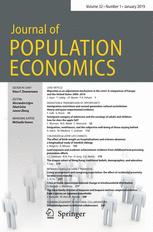The study using Canadian experiences finds that properly structured pro-natal policies can successfully increase fertility among different segments of the population.
Read more in:
Natalie Malak, Md Mahbubur Rahman & Terry A. Yip:
Baby bonus, anyone? Examining heterogeneous responses to a pro-natalist policy
Journal of Population Economics, Vol. 32 (2019), Issue 4 (October), pp. 1205-1246.
GLO Fellows Natalie Malak and Md Mahbubur Rahman
Journal Website, complete issue 4.
Author Abstract: We examine the impact of the Allowance for Newborn Children, a universal baby bonus offered by the Canadian province of Quebec, on birth order, sibship sex composition, income, and education. We find a large response for third- and higher-order births for which the bonus was more generous. Interestingly, though, we find stronger response if there were two previous sons or a previous son and daughter rather than two previous daughters. We also find, in addition to a transitory effect, a permanent effect, with the greatest increase in one daughter-two son families among three-child households. Moreover, we find a hump shape response by income group, with the greatest response from middle-income families. Also, women with at least some post-secondary education respond more to the policy than those with less. These findings suggest that properly structured pro-natal policies can successfully increase fertility among different segments of the population while simultaneously diminishing the effect of gender preferences and fertility disparity related to women’s education.
Read also the Lead Article of issue 4 (2019):
Gautam Hazarika, Chandan Kumar & Sudipta Sarangi:
“Ancestral ecological endowments and missing women“
Journal of Population Economics, Vol. 32 (2019), Issue 4 (October), pp. 1101-1123
Journal Website, complete issue 4. Paper PDF – OPEN ACCESS.
GLO Fellows Gautam Hazarika, Chandan Kumar Jha & Sudipta Sarangi

Ends;

